I have some list of structures like this:
struct va_data
{
public int item_id;
public int type_id;
public double item_value;
public DateTime value_date;
}
I trying group the list by type_id and take items where value_date is maximum then group by item_id and take items only where item_value is minimum
There is my syntax
from x in dataList
group x by x.type_id into grouped
select grouped.Where(x => x.value_date == grouped.Max(y => y.value_date))
.GroupBy(x => x.item_id) // and here i was stuck.
Example
var dataList = new []
{
new va_data {item_id = 1, type_id = 1, item_value = 0, value_date = "2013.07.29"},
new va_data {item_id = 1, type_id = 1, item_value = 1, value_date = "2013.07.30"},
new va_data {item_id = 2, type_id = 1, item_value = 0, value_date = "2013.07.29"},
new va_data {item_id = 2, type_id = 1, item_value = 1, value_date = "2013.07.29"},
new va_data {item_id = 4, type_id = 2, item_value = 5, value_date = "2013.07.29"},
new va_data {item_id = 4, type_id = 3, item_value = 9, value_date = "2013.07.30"},
};
The result must be
var dataListResult = new []
{
new va_data {item_id = 1, type_id = 1, item_value = 1, value_date = "2013.07.30"},
new va_data {item_id = 2, type_id = 1, item_value = 0, value_date = "2013.07.29"},
new va_data {item_id = 4, type_id = 2, item_value = 5, value_date = "2013.07.29"},
}
